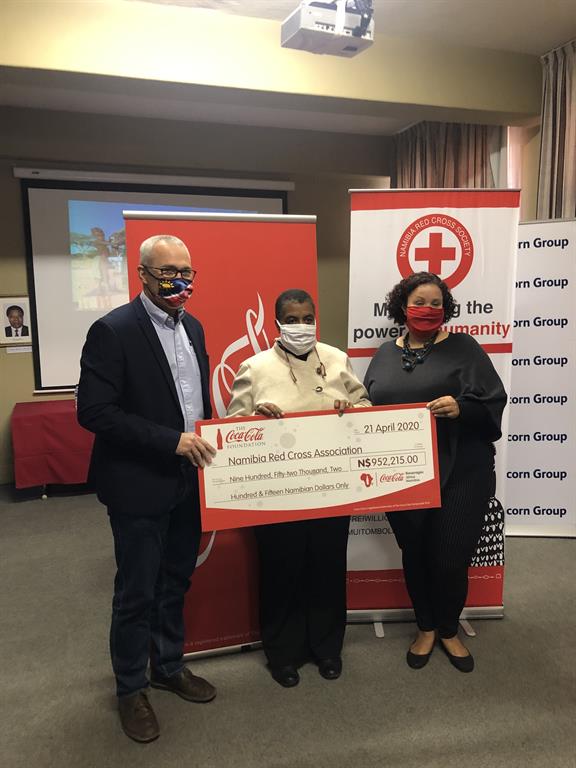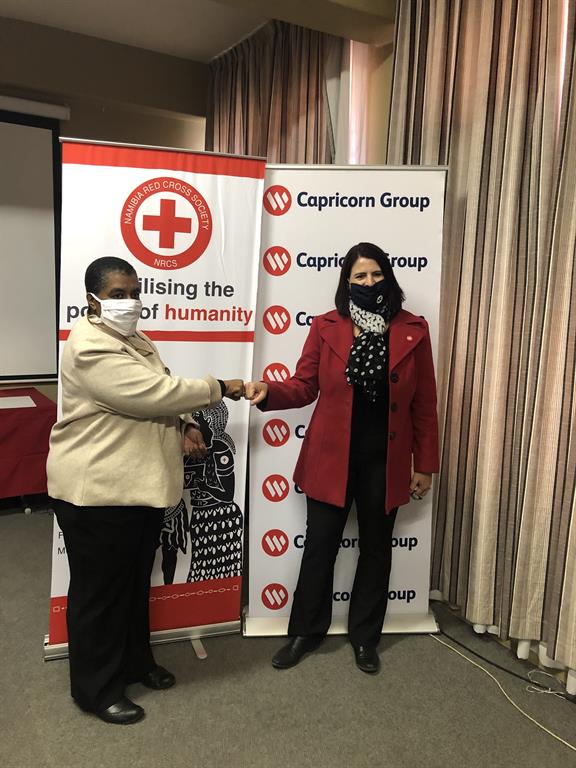Red Cross launches national Covid-19 response plan
The Namibia Red Cross Society (NCRS) has launched its national Covid-19 response plan at its headquarters in Windhoek.
The plan aims to reduce the spread of secondary transmission of the virus as well as to contain the outbreak in ten regions of the country, namely Khomas, Otjozondjupa, Kunene, Omusati, Ohangwena, Oshana, Oshikoto, Kavango East and West, and Zambezi. The NRCS currently has a presence in all of these regions.
The rolling out of activities started at the beginning of April already.
Bernadette Bock, the secretary-general of the NRCS, shared a project overview.
“Our response to date has focused on the promotion of effective community engagement, risk communication and hygiene promotion aimed at positively influencing adherence and behavioural change. Components of psychosocial support, stigma reduction and possible violence prevention are also included in our material and approaches,” she said.
Bock further mentioned that community awareness-raising and engagement is supported by the distribution of hand sanitisers, disinfectants, masks and gloves to 25 763 individuals to date.
Trained Red Cross volunteers show households how to construct tippy-taps to be able to wash their hands regularly. The number of tippy-taps constructed to date is 880.
“As part of the support, we also distribute water containers for safe water storage, 1 000 distributed to date. Targeted beneficiaries for this support include the most vulnerable members of our communities such as the elderly, women-headed households, expectant and lactating mothers, households with more than four minor children as well as those negatively affected by Covid-19. Through the distribution of health packs, we aim to support people in need of shelter,” Bock said.
The impact of Covid-19 is also being felt on an economic level. Because of job losses, more and more families are having less and less to eat. Therefore, the NRCS expanded its Covid-19 response plan to include food or livelihood support as well. They aim to provide 2 160 households in four regions with cash vouchers for three months.
For this plan to be implemented successfully, the staff and volunteers of NRCS should be safeguarded and this is accomplished through training and the provision of personal protective equipment.
To date, NRCS has mobilised and trained 230 volunteers on Covid-19 prevention measures. They will provide health education and psychosocial support to communities at the village and regional levels during the outbreak of Covid-19.
The Namibia Red Cross has been able to attract partners to support its activities to the tune of N$8 815 805. This was achieved when partners such as the Coca-Cola Foundation approached NRCS, willing to support the response plan with a generous N$939 000.
These funds are earmarked for water and sanitation as well as risk communication activities in the Khomas Region. Besides, Coca-Cola Namibia will help with transportation of goods and also donated large quantities of 20- and 60-litre water containers which will be used to manufacture handwashing stations.
The Capricorn Group donated N$300 000 for the upscaling of water and sanitation as well as risk communication activities in the Ohangwena and Omusati regions.
Nedbank Namibia also reached out to support food security of at least 100 households in the Khomas Rural constituency through the distribution of food parcels.
Cymot Namibia supported the initiative by giving a discount on purchases.
The NRCS also received N$950 000 as well as technical support from the British Red Cross, while the Spanish Red Cross delegated an expert to technically support the rollout of the plan.
The plan aims to reduce the spread of secondary transmission of the virus as well as to contain the outbreak in ten regions of the country, namely Khomas, Otjozondjupa, Kunene, Omusati, Ohangwena, Oshana, Oshikoto, Kavango East and West, and Zambezi. The NRCS currently has a presence in all of these regions.
The rolling out of activities started at the beginning of April already.
Bernadette Bock, the secretary-general of the NRCS, shared a project overview.
“Our response to date has focused on the promotion of effective community engagement, risk communication and hygiene promotion aimed at positively influencing adherence and behavioural change. Components of psychosocial support, stigma reduction and possible violence prevention are also included in our material and approaches,” she said.
Bock further mentioned that community awareness-raising and engagement is supported by the distribution of hand sanitisers, disinfectants, masks and gloves to 25 763 individuals to date.
Trained Red Cross volunteers show households how to construct tippy-taps to be able to wash their hands regularly. The number of tippy-taps constructed to date is 880.
“As part of the support, we also distribute water containers for safe water storage, 1 000 distributed to date. Targeted beneficiaries for this support include the most vulnerable members of our communities such as the elderly, women-headed households, expectant and lactating mothers, households with more than four minor children as well as those negatively affected by Covid-19. Through the distribution of health packs, we aim to support people in need of shelter,” Bock said.
The impact of Covid-19 is also being felt on an economic level. Because of job losses, more and more families are having less and less to eat. Therefore, the NRCS expanded its Covid-19 response plan to include food or livelihood support as well. They aim to provide 2 160 households in four regions with cash vouchers for three months.
For this plan to be implemented successfully, the staff and volunteers of NRCS should be safeguarded and this is accomplished through training and the provision of personal protective equipment.
To date, NRCS has mobilised and trained 230 volunteers on Covid-19 prevention measures. They will provide health education and psychosocial support to communities at the village and regional levels during the outbreak of Covid-19.
The Namibia Red Cross has been able to attract partners to support its activities to the tune of N$8 815 805. This was achieved when partners such as the Coca-Cola Foundation approached NRCS, willing to support the response plan with a generous N$939 000.
These funds are earmarked for water and sanitation as well as risk communication activities in the Khomas Region. Besides, Coca-Cola Namibia will help with transportation of goods and also donated large quantities of 20- and 60-litre water containers which will be used to manufacture handwashing stations.
The Capricorn Group donated N$300 000 for the upscaling of water and sanitation as well as risk communication activities in the Ohangwena and Omusati regions.
Nedbank Namibia also reached out to support food security of at least 100 households in the Khomas Rural constituency through the distribution of food parcels.
Cymot Namibia supported the initiative by giving a discount on purchases.
The NRCS also received N$950 000 as well as technical support from the British Red Cross, while the Spanish Red Cross delegated an expert to technically support the rollout of the plan.





Comments
Namibian Sun
No comments have been left on this article